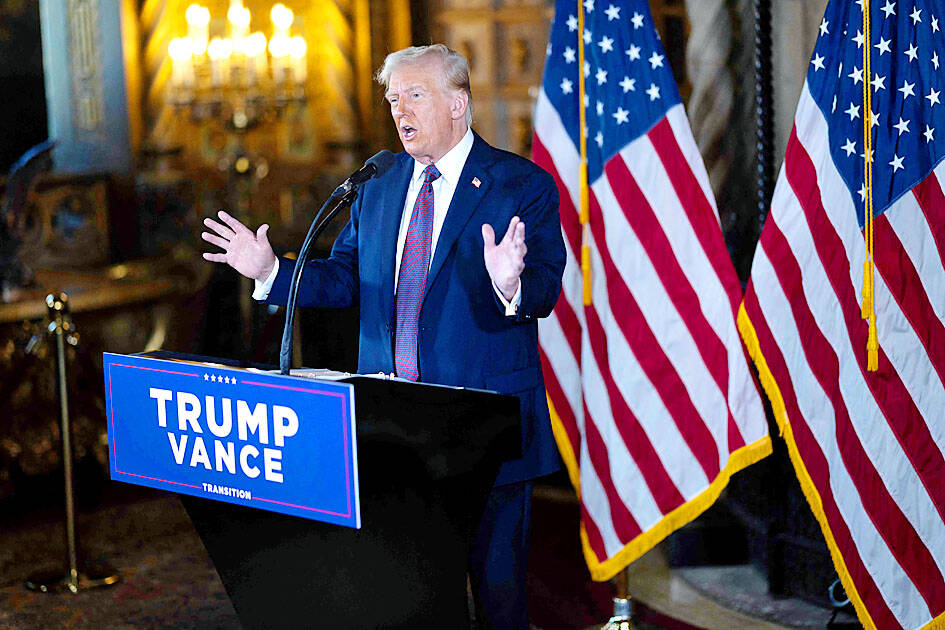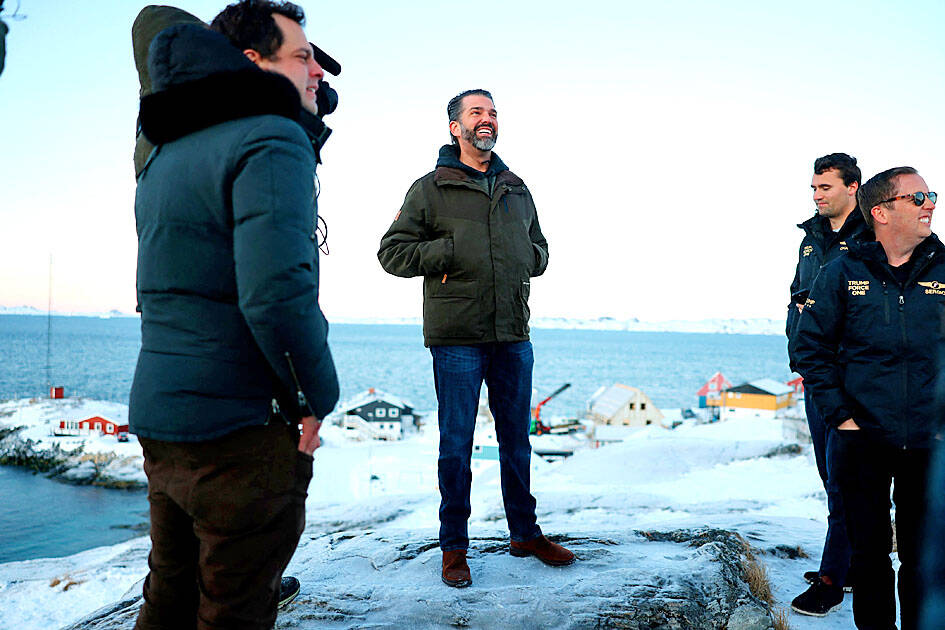In the space of an hour, US president-elect Donald Trump called for absorbing Canada, declined to rule out using military force to seize the Panama Canal and Greenland, demanded NATO allies spend 5 percent of GDP on defense and vowed “all hell would break loose” in the Middle East if Hamas does not release Israeli hostages before he takes office.
He also promised to rename the Gulf of Mexico the Gulf of America.
“What a beautiful name — and it’s appropriate,” Trump told a news conference on Tuesday at his Mar-a-Lago estate in Florida.

Photo: AFP
He did not explain how any of these improbable pledges would come to pass, beyond threatening to impose tariffs on nations, including Denmark, that do not cooperate.
However, the rambling session erased any doubt that Trump plans to take foreign policy to new precedent-shattering levels when he takes office in less than two weeks.
Panama has already vowed not to give up the canal, and Denmark says it has no plans to cede control of Greenland.

Photo: Emil Stach and Ritzau Scanpix via AFP
Trump did not mention that the US has not spent 5 percent of GDP on defense since the 1980s. The current figure is about 3 percent.
However, the rhetoric all fits with a far more emboldened stance, to say and do almost whatever he wants given the mandate he believes he received for a second term after winning the popular and electoral votes.
If Trump’s foreign policy approach in his first term flirted with trolling the rest of the world, he is taking it to a new level this time around — and well before his second term even starts.
The maximalist positions hold appeal for a president who has openly expressed respect for autocrats including Russian President Vladimir Putin and Chinese President Xi Jinping (習近平).
No US president has overseen the expansion of US territory since 1947, when then-US president Harry Truman oversaw the acquisition of several small Pacific Ocean island chains from Japan in the aftermath of World War II.
Halfway through his news conference on Tuesday, Trump summoned his appointed Middle East envoy, real-estate investor and golf buddy Steve Witkoff, to the stage.
“If they’re not back by the time I get into office, all hell will break out in the Middle East,” Trump said of the hostages being held by Hamas.
Amid the speculation about Greenland, his son Donald Jr flew to Nuuk, the territory’s capital, for what he described as nothing more than a day trip.
However, he brought his father’s anointed head of presidential personnel, Sergio Gor, and popular right-wing podcaster Charlie Kirk along for the trip.
Some members of the group wore “Trump Force One” jackets with their names embroidered on the lapel.

TRAGEDY STRIKES TAIPEI: The suspect died after falling off a building after he threw smoke grenades into Taipei Main Station and went on a killing spree in Zhongshan A 27-year-old suspect allegedly threw smoke grenades in Taipei Main Station and then proceeded to Zhongshan MRT Station in a random killing spree that resulted in the death of the suspect and two other civilians, and seven injured, including one in critical condition, as of press time last night. The suspect, identified as a man surnamed Chang Wen (張文), allegedly began the attack at Taipei Main Station, the Taipei Fire Department said, adding that it received a report at 5:24pm that smoke grenades had been thrown in the station. One man in his 50s was rushed to hospital after a cardiac arrest

SAFETY FIRST: Double the number of police were deployed at the Taipei Marathon, while other cities released plans to bolster public event safety Authorities across Taiwan have stepped up security measures ahead of Christmas and New Year events, following a knife and smoke bomb attack in Taipei on Friday that left four people dead and 11 injured. In a bid to prevent potential copycat incidents, police deployments have been expanded for large gatherings, transport hubs, and other crowded public spaces, according to official statements from police and city authorities. Taipei Mayor Chiang Wan-an (蔣萬安) said the city has “comprehensively raised security readiness” in crowded areas, increased police deployments with armed officers, and intensified patrols during weekends and nighttime hours. For large-scale events, security checkpoints and explosives

A car bomb killed a senior Russian general in southern Moscow yesterday morning, the latest high-profile army figure to be blown up in a blast that came just hours after Russian and Ukrainian delegates held separate talks in Miami on a plan to end the war. Kyiv has not commented on the incident, but Russian investigators said they were probing whether the blast was “linked” to “Ukrainian special forces.” The attack was similar to other assassinations of generals and pro-war figures that have either been claimed, or are widely believed to have been orchestrated, by Ukraine. Russian Lieutenant General Fanil Sarvarov, 56, head

PUBLIC SAFETY: The premier said that security would be tightened in transport hubs, while President Lai commended the public for their bravery The government is to deploy more police, including rapid response units, in crowded public areas to ensure a swift response to any threats, President William Lai (賴清德) said yesterday after a knife attack killed three people and injured 11 in Taipei the previous day. Lai made the remarks following a briefing by the National Police Agency on the progress of the investigation, saying that the attack underscored the importance of cooperation in public security between the central and local governments. The attack unfolded in the early evening on Friday around Taipei Main Station’s M7 exit and later near the Taipei MRT’s Zhongshan